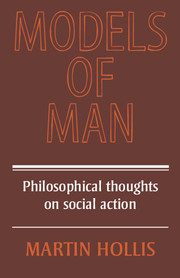Crossref Citations
This Book has been
cited by the following publications. This list is generated based on data provided by Crossref.
Giddens, Anthony
1979.
Central Problems in Social Theory.
p.
49.
Outka, Gene
1980.
CHARACTER, VISION, AND NARRATIVE.
Religious Studies Review,
Vol. 6,
Issue. 2,
p.
110.
Agnew, John A.
and
Duncan, James S.
1981.
The transfer of ideas into Anglo-American human geography.
Progress in Human Geography,
Vol. 5,
Issue. 1,
p.
42.
Mitchell, Harvey
1981.
Politics in the service of knowledge: The debate over the administration of medicine and welfare in late eighteenth‐century France.
Social History,
Vol. 6,
Issue. 2,
p.
185.
Burwood, Les. R.V.
and
Brady, Carol A.
1981.
Philosophical Models of Man: with special reference to the teaching of ESN children.
Educational Review,
Vol. 33,
Issue. 1,
p.
17.
Spegele, Roger D.
1982.
Rediscovering debates in the international studies: Morton Kaplan's system epistemology revisited.
Theory and Decision,
Vol. 14,
Issue. 3,
p.
293.
Gunnell, John G.
1982.
Interpretation and the History of Political Theory: Apology and Epistemology.
American Political Science Review,
Vol. 76,
Issue. 2,
p.
317.
Harré, Rom
1982.
Social Psychology.
p.
75.
Tuomela, Raimo
1982.
Philosophy of action / Philosophie de l’action.
p.
15.
Farr, James
1982.
Humean explanations in the moral sciences.
Inquiry,
Vol. 25,
Issue. 1,
p.
57.
van der Lann, Lambert
and
van Piersma, Andries
1982.
The Image of Man: Paradigmatic Cornerstone in Human Geography.
Annals of the Association of American Geographers,
Vol. 72,
Issue. 3,
p.
411.
Barnard, F. M.
and
Vernon, Richard
1983.
Recovering Politics for Socialism: Two Responses to the Language of Community.
Canadian Journal of Political Science,
Vol. 16,
Issue. 4,
p.
717.
Giles, Steve
1983.
Delimited by discourse: Some problems with the new critical practice.
Renaissance and Modern Studies,
Vol. 27,
Issue. 1,
p.
139.
Goldie, Mark
1983.
Obligations, Utopias, and their Historical Context.
The Historical Journal,
Vol. 26,
Issue. 3,
p.
727.
Thrift, N J
1983.
On the Determination of Social Action in Space and Time.
Environment and Planning D: Society and Space,
Vol. 1,
Issue. 1,
p.
23.
Harré, Rom
1983.
Science under Scrutiny.
p.
139.
Hoaglund, John
1984.
Ethical theory and practice: Is there a gap?.
Journal of Business Ethics,
Vol. 3,
Issue. 3,
p.
201.
1984.
Review Essays.
Religious Studies Review,
Vol. 10,
Issue. 3,
p.
209.
O'Hagan, Timothy
1984.
Must Time have a Stop? Hegelian Reflections.
Journal of the British Society for Phenomenology,
Vol. 15,
Issue. 3,
p.
231.
Fisher, Walter R.
1984.
Narration as a human communication paradigm: The case of public moral argument.
Communication Monographs,
Vol. 51,
Issue. 1,
p.
1.





